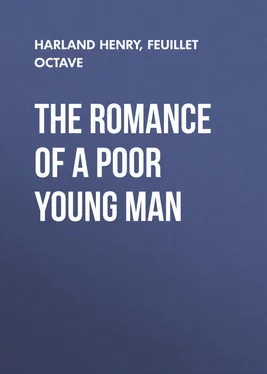Henry Harland - The Romance of a Poor Young Man
Здесь есть возможность читать онлайн «Henry Harland - The Romance of a Poor Young Man» — ознакомительный отрывок электронной книги совершенно бесплатно, а после прочтения отрывка купить полную версию. В некоторых случаях можно слушать аудио, скачать через торрент в формате fb2 и присутствует краткое содержание. Жанр: foreign_antique, foreign_prose, на английском языке. Описание произведения, (предисловие) а так же отзывы посетителей доступны на портале библиотеки ЛибКат.
- Название:The Romance of a Poor Young Man
- Автор:
- Жанр:
- Год:неизвестен
- ISBN:нет данных
- Рейтинг книги:5 / 5. Голосов: 1
-
Избранное:Добавить в избранное
- Отзывы:
-
Ваша оценка:
- 100
- 1
- 2
- 3
- 4
- 5
The Romance of a Poor Young Man: краткое содержание, описание и аннотация
Предлагаем к чтению аннотацию, описание, краткое содержание или предисловие (зависит от того, что написал сам автор книги «The Romance of a Poor Young Man»). Если вы не нашли необходимую информацию о книге — напишите в комментариях, мы постараемся отыскать её.
The Romance of a Poor Young Man — читать онлайн ознакомительный отрывок
Ниже представлен текст книги, разбитый по страницам. Система сохранения места последней прочитанной страницы, позволяет с удобством читать онлайн бесплатно книгу «The Romance of a Poor Young Man», без необходимости каждый раз заново искать на чём Вы остановились. Поставьте закладку, и сможете в любой момент перейти на страницу, на которой закончили чтение.
Интервал:
Закладка:
Back in the little room I now occupy, under the roof of the hôtel , which is mine no longer, I wished to convince myself that the full knowledge of my misery had not depressed me to a degree unworthy of a man. So I have sat down to write an account of this decisive day of my life, endeavouring to preserve exactly the phraseology of the old notary, a mixture of stiffness and courtesy, of mistrust and kind feeling, which more than once made me smile, though my heart was bleeding.
I am face to face with poverty. Not the haughty, hidden, and poetic poverty that among forests and deserts and savannas fired my imagination, but actual misery, need, dependence, humiliation, and something worse even – the poverty of the rich man who has fallen; poverty in a decent coat; the poverty that hides its ungloved hands from the former friends it passes in the street. Come, brother, courage, courage…!
Monday, April 27th.For five days I have been waiting in vain for news of M. Laubépin. I had counted considerably on the interest that he had appeared to feel in me. His experience, his business connections, and the number of people he knows, would enable him to be of service to me. I was ready to take all necessary steps under his direction, but, left to myself, I do not know which way to turn. I thought he was one of the men who promise little and do much. I am afraid that I have been mistaken. This morning I determined to go to his house on the pretext of returning the papers he had given me, after verifying their dreary exactitude. I was told that he had gone to enjoy a taste of country life at some château in the heart of Brittany. He would be away two or three days longer. I was completely taken aback. I had not only the pain of finding indifference and desertion where I had looked for the readiness of devoted friendship, I had, in addition, the bitter disappointment of returning, as I went, with an empty purse. I had, in fact, intended to ask M. Laubépin to advance me some money from the three or four thousand francs due to us after full payment of our debts. In vain have I lived like an anchorite since came to Paris. The small sum I had reserved for my journey is completely exhausted – so completely that, after making a truly pastoral breakfast this morning — castanceæ molles et pressi copia lactis – I was obliged to have recourse to a kind of trickery for my dinner to-night. I will make melancholy record of it here.
The less one has had for breakfast, the more one wants for dinner. I had felt all the force of this axiom long before the sun had finished its course. Among the strollers whom the mild air had attracted to the Tuileries this afternoon to watch the first smiles of spring playing on the faces of the marble fauns, the observant might have noted a young man of irreproachable appearance who seemed to study the awakening of nature with extraordinary interest. Not satisfied with devouring the fresh verdure with his eyes, he would furtively detach the young, appetizing shoots and the half-opened leaves from their stems, and put them to his lips with the curiosity of a botanist. I convinced myself in this way that this form of nourishment, suggested by accounts of shipwrecks, is of very little value. Still, I enriched my experience with some interesting discoveries: for instance, I know now that the foliage of the chestnut has an exceedingly bitter taste; that the rose is not unpleasant; that the lime is oily and rather agreeable; the lilac pungent – and I believe unwholesome.
Meditating on these discoveries, I walked towards Hélène's convent. I found the parlour as crowded as a hive, and I was more than usually bewildered by the tumultuous confidences of the young bees. Hélène arrived, her hair in disorder, her cheeks flushed, her eyes red and sparkling. In her hand she had a piece of bread as long as her arm. As she embraced me in an absent way, I asked:
"Well, little girl, what is the matter? You've been crying."
"No, Maxime, no, it's nothing."
"Well, what is it? Now tell me…"
In a lower tone she said:
"Oh, I am very miserable, dear Maxime!"
"Really? Tell me all about it while you eat your bread."
"Oh, I shall certainly not eat my bread. I am too miserable to eat. You know Lucy – Lucy Campbell, my dearest friend. Well, we've quarrelled completely."
"Oh, mon Dieu ! Don't worry, darling, you'll make it up. It will be all right, dear."
"Oh, Maxime, that's impossible. It was such a serious quarrel. It was nothing at first, but you know one gets excited and loses one's head. Listen, Maxime! We were playing battledore, and Lucy made a mistake about the score. I was six hundred and eighty, and she was only six hundred and fifteen, and she declared she was six hundred and sixty-five! You must say that was a little too bad. Of course I said my figure was right, and she said hers was. 'Well, mademoiselle,' I said to her, 'let us ask these young ladies. I appeal to them.' 'No, mademoiselle,' she replied, 'I am sure I am right, and you don't play fair.' 'And – and you, mademoiselle,' I said to her – 'you are a liar!' 'Very well, mademoiselle,' she said then, 'I despise you too much to answer you.' Just at that moment Sister Sainte-Félix came up, which was a good thing, for I am sure I should have hit her. Now, you know what happened. Can we possibly make it up? No, it is impossible; it would be cowardly. But I can't tell you how I suffer. I don't believe there's any one in the world so miserable as I am."
"Yes, dear, it's difficult to imagine anything more distressing; but it seems to me that you partly brought it on yourself, for it was you who used the most offensive word. Tell me, is Lucy in the parlour?"
"Yes, there she is, in the corner."
With a dignified and careful movement of her head she indicated a very fair little girl. Her cheeks, too, were flushed, and her eyes were red. Apparently she was giving an account of the drama, which Sister Sainte-Félix had so fortunately interrupted, to an old lady who was listening attentively.
Mlle. Lucy, while she talked with an earnestness appropriate to the subject, kept looking furtively at Hélène and me.
"Dear child," I said to Hélène, "do you trust me?"
"Yes, Maxime, I trust you very much."
"In that case I will tell you what to do. Go very gently behind Mlle. Lucy's chair; take her head in your hands – like this, when she is not looking – and kiss her on both cheeks – like this, with all your might – and then you will see what she will do in her turn."
For a second or two Hélène seemed to hesitate; then she set off at a great rate, fell like a thunder-clap on Mlle. Campbell, but nevertheless gave her the sweetest of surprises. The two young sufferers, at last eternally united, mingled their tears in a touching group, while the respectable old Mrs. Campbell blew her nose with a noise as of a bagpipe.
Hélène came back to me radiant.
"Well, dear," I said, "I hope you're going to eat your bread now."
"Oh, no! I can't, Maxime. I am too much excited, and – besides, I must tell you – to-day a new pupil came and gave us quite a feast of meringues, éclairs, and chocolate-creams, and I am not a bit hungry. And I am in a great difficulty about it, because when we're not hungry we have to put our bread back in the basket, and in my trouble I forgot, and I shall be punished. But, Maxime, as we're crossing the court when you go, I shall try to drop it down the cellar without any one seeing.
"What, little sister!" I said, colouring a little, "you are going to waste that large piece of bread?"
"It isn't good of me I know, because, perhaps, there are poor people who would be very glad of it, aren't there, Maxime?"
"There certainly are, dear."
"But what do you want me to do? The poor people don't come in here."
Читать дальшеИнтервал:
Закладка:
Похожие книги на «The Romance of a Poor Young Man»
Представляем Вашему вниманию похожие книги на «The Romance of a Poor Young Man» списком для выбора. Мы отобрали схожую по названию и смыслу литературу в надежде предоставить читателям больше вариантов отыскать новые, интересные, ещё непрочитанные произведения.
Обсуждение, отзывы о книге «The Romance of a Poor Young Man» и просто собственные мнения читателей. Оставьте ваши комментарии, напишите, что Вы думаете о произведении, его смысле или главных героях. Укажите что конкретно понравилось, а что нет, и почему Вы так считаете.












